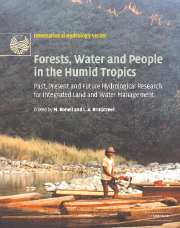 Forests, Water and People in the Humid Tropics
Forests, Water and People in the Humid Tropics Book contents
- Frontmatter
- Contents
- List of contributors
- Foreword
- Preface
- Acknowledgements
- Symposium and Workshop
- Introduction
- Part I Current trends and perspectives on people–land use–water issues
- Part II Hydrological processes in undisturbed forests
- Part III Forest disturbance, conversion and recovery
- Part IV New methods for evaluating effects of land-use change
- Part V Critical appraisals of best management practices
- Conclusion: Forests, water and people in the humid tropics: an emerging view
- Plate section
Preface
Published online by Cambridge University Press: 12 January 2010
- Frontmatter
- Contents
- List of contributors
- Foreword
- Preface
- Acknowledgements
- Symposium and Workshop
- Introduction
- Part I Current trends and perspectives on people–land use–water issues
- Part II Hydrological processes in undisturbed forests
- Part III Forest disturbance, conversion and recovery
- Part IV New methods for evaluating effects of land-use change
- Part V Critical appraisals of best management practices
- Conclusion: Forests, water and people in the humid tropics: an emerging view
- Plate section
Summary
Although the areal extent of tropical rainforests has changed markedly through natural fluctuations in climate at a geological time scale, the rate of tropical forest harvesting and clearance during the second half of the twentieth century, has been unprecedented. Fuelled by the soaring demands for tropical hardwoods by ‘northern’ economies, timber harvesting relies heavily on the use of mechanised felling and extraction. This, in turn, has greatly disturbed the remaining vegetation, the soils and therefore the hydrological functioning of the forest. Further, the economic necessity for an adequate return on the capital invested in equipment, vehicles, roads and wood-processing mills makes it desirable to harvest all marketable logs during a single felling cycle, often at the cost of future growth. At the same time, traditional shifting cultivation practices of local communities have become unsustainable in many places due to the increased pressure on the land exerted by a growing population, resulting in gradual degradation or even total disappearance of closed forest. In addition to such ‘unplanned’ forest degradation and conversion there is an increasing trend towards planned, government-led conversions of tropical forest to apparently more profitable cattle ranching or commercial plantations.
The extensive disappearance of tropical forests during the last five decades has raised global alarm over the threats to climatic stability and the hydrological functioning of river basins posed by continued forest conversion, next to the well-being of forest dwellers and the conservation of biodiversity.
- Type
- Chapter
- Information
- Forests, Water and People in the Humid TropicsPast, Present and Future Hydrological Research for Integrated Land and Water Management, pp. xiii - xivPublisher: Cambridge University PressPrint publication year: 2005
